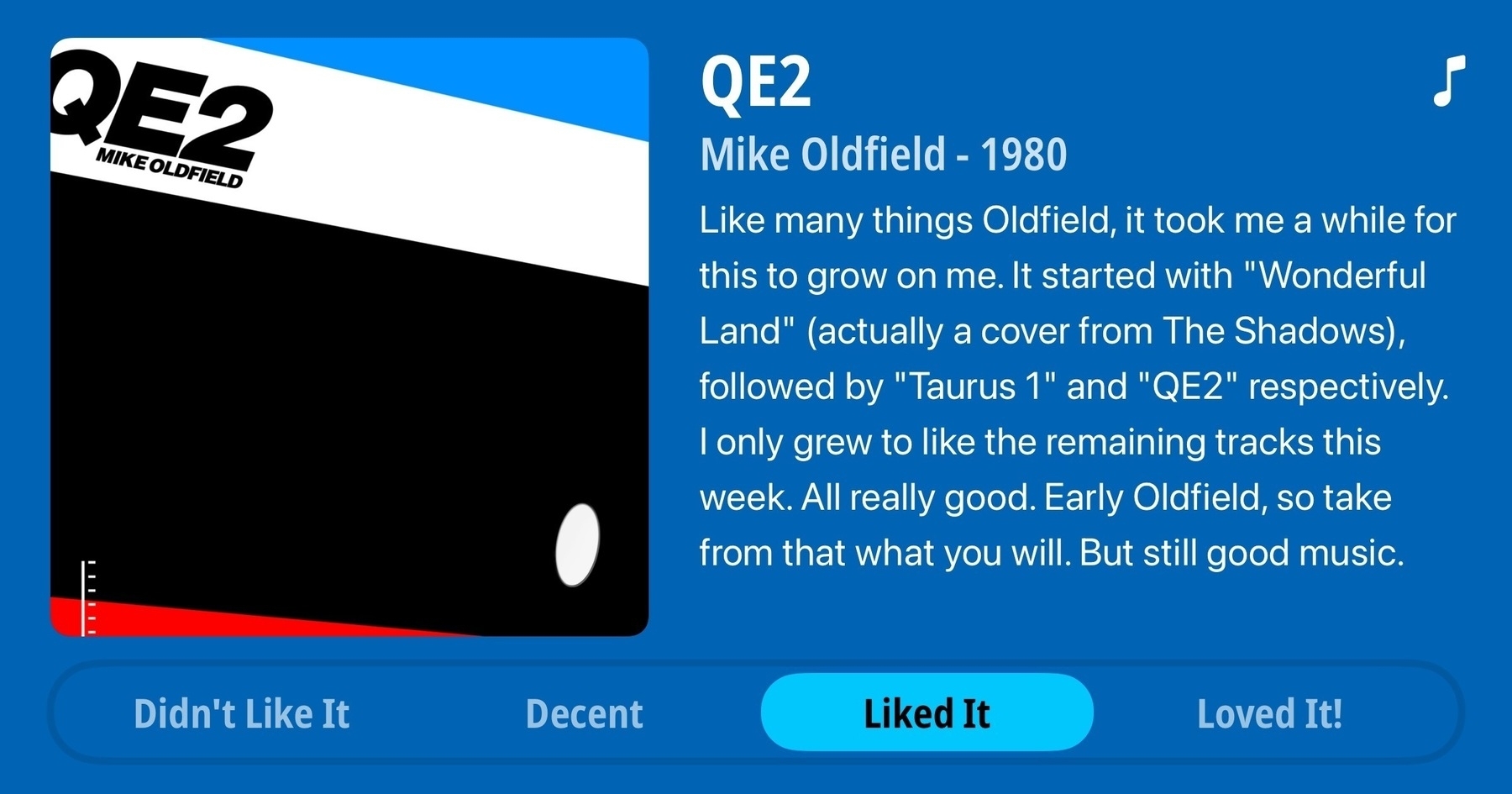-
Just saw a magpie have a go at a cyclist, twice. You know what this means: it’s officially swooping season again. 👷♂️
-
Released version 1.3.1 of Postlists for Micro.blog. Notable changes in this release are:
- A new
title-matchesattribute, which can be used to filter the list of posts to those with titles that match a regular expression. Check out the documentation on this for some examples. - Fixed an issue where using the shortcode without any attributes resulted in an empty list. The cause of this was Hugo returning some strange things when a shortcode is called without arguments.
I also clarified the documentation a little, particularly around the use of the
alphasort order. Basically, if you have a collection of posts without titles, the alpha sort order may look a little strange, as it only uses the title when ordering posts. I’m not sure what I’m going to do to improve this — there’s no real way to sort based on post body — so in lieu of a fix, I just made sure to explain that. It’s not a great solution, but hopefully it’ll clear this behaviour up.If you’ve got the Postlists plug-in installed, you should be able to upgrade to this version by going to the Plug-ins section in Micro.blog.
- A new
-
Can’t hear what your friend is saying? Instead of speaking loudly, consider taking your Air Pods out first. You may experience a difference. 🙉
-
Does Github just refuse to send emails out when a new issue is created? Opened a repository and found an open issue that was over a month old. 😠
Apologies for the delay.
-
Okay, get out more goal for August has been organised. I won’t fail this month!
-
When it comes to making real-world friends, I am absolutely, bloody awful (I know everyone says this but trust me: as bad as you may think you are, I’m worse). But by shear accident of showing up at the same cafe at the same time every weekend, one might be starting to ignite.
Or at the very least, it may have a chance to. While talking with this fellow this morning, my mind casted back to this piece by JCProbably about how making friends as an adult requires effort, yet it’s worth it at the end (my writing about it is not doing it justice; go read it, it’s good). I think this might be worth it, so I’ll give it a try.
But first, I need to get overcome a rather embarrassing hurdle: I need to get confirmation of his name. I remember making a note of it, and based on what I found, I think I’ve found it (there’s no date on the note) but I’m not certain. Yeah, like I said: making friends is not my strength. 😏
-
This week’s earworm: QE2, by Mike Oldfield. 🎵

-
Seems like every work wiki I encounter is always messy. I think one of the reasons for this is that users believe modifying or deleting a page would be permanent. This is usually not the case: many wikis have versioning features. But they’re always hidden away and I wonder if people just forget they’re there. The version history also seem to be tied to pages, as oppose to the wiki as a whole, meaning that recovering a deleted page is a different set of actions than comparing an older version of an existing page.
Maybe the way to solve both issues is to have a single big “version” picker at the top-left of the screen. This doesn’t recover just the current page. It recovers the entire site, and allows the user to visit the state of the wiki at any time: a week ago, or a month ago, all the way to the beginning of time. All the deleted pages will be restored, and previous versions of updated pages will be recalled (new pages will disappear, which may or may not be what you’d want). This will work in concert with the page-specific version history, which I think is still needed for actually reverting pages to their previous version.
It’s almost like the entire wiki is backed by a Git. I guess that’s what I’m suggesting: wiki’s should use something like Git for this, only with a much nicer UI.
-
On The Little Things of Data Representation
Attention to the finer details of how marshalled data is represented is important. Don’t neglect it. Continue reading →
-
Dear Go developers,
You don’t need to return pointers,
Unless you do need to return pointers.
But if you think you need to return pointers,
You probably don’t need to return pointers.Instead, consider just returning regular struct values. Keep the nil-pointer panics at bay.
-
Seeing some very interesting visitor pattens over the last two days. There seems to be two or three visitors from the US opening what seems to be every single page on this site. It’d be interesting to know who it is… or what it is. Maybe I should ask around.
-
Spiders are out in force this week. Third day in a row where I had to kill a white-tail that got inside. 🕷️
-
I’m the first to admit that my spelling is pretty atrocious, so I’m heavily reliant on spellcheckers. But there has been more than one occasion where I’ve chosen what I though was a correction, only to find out later that I ended up choosing a completely different word than I wanted. So when I can, I always try to check the definition of the word after selecting it.
This technique tends to breakdown on iPadOS, for the reasons laid out in this dramatisation of lunch this afternoon:
L: …it was only when I received it with no further cutlary that I…
iPadOS: Woah, hold on! That word "cutlary" you have there. It's definitely not the one you want.
L: Oh, what should it be then?
iPadOS: It should be "cutlery."
L: Should it? Can you look up the definition of "cutlery?"
iPadOS: Oh, um. Ahhh. No results.
L: So is it "cutlery?" Is that the word I want?
iPadOS: Oh yeah. That's definitely how you spell "cutlery."
L: No, I mean, is this the word I should be using here?
iPadOS: Don't know. But that's absolutely the way to spell it.
L: (sigh) DuckDuckGo, what's the definition of "cutlery?"
🦆: Cutlery includes hand implements for eating food, such as knifes and forks…
L: Great, thanks. (fix typo)
-
Went to the cafe today and ordered my lunch. It came out with 2 forks and a knife. It was only when I went back for dessert, and received it with no further cutlery, that I realised that must be what the second fork is for. The cafe staff know me too well. 😀
-
The number of times I work from home has reduced quite considerably, so I’m not making coffee a home as often as I used to. The beans themselves confirm this: the coffee I’m drinking right now tastes rather stale. 😣
-
Upgraded my Obsidian plan which gives me 10 vaults to sync. I’m currently using 2: one for my personal notes and one for TIL Computer. I’m contemplating moving my journal to a 3rd. Just need to find uses for the other 7.
-
Had an interesting dream last night where I was at an open garden while King Charles III was in attendance. Some people I was with were eager to meet Him but I felt otherwise, and I went outside the pavilion and waited in the trees beside the door. The King’s entourage started exiting the building and a secret service/protocol officer that I just noticed I was standing next to said to me, “when the King looks at you, you do what I say.” Yeah, even in my dreams there are people telling me what to do. 😄
Woke with Come, ye Sons of Art playing in my ears.
-
It might be time for the City of Melbourne to close off Collins St. to cars between Spenser and King. Tram Stop 1 is so busy in the afternoon. So many people are transferring to trains. It’d be easier if they can use what is currently the road. That leaves the busses but they can use the tram line.
-
I’ve was really excited about LLM-powered auto-complete when I first started using it, but now I’m starting to find it a little annoying, particularly if completions are offered unbidden. It feels like the IDE equivalent of someone attempting to finish your sentences and often getting it wrong.
-
🛠️ CyberChef
A nice website for doing the sort of things one tends to do when writing software. Quite a large suite of tools: JWT decode, Protobuf decode, X.509 cert decode, UNIX epoch conversion, etc. Runs completely within the browser. In fact you can download the HTML+JS and open it locally.
-
Open any book about creativity and the author would say something like “ideas do not beget action; action beget ideas.” I’ve never really internalised this until quite recently, when I found myself getting many more ideas for a project only after working on it. I just needed to start work.
-
If you’ve designed a REST API that requires users to distinguish between a
nullvalue and a missing value for any particular JSON field, then you’ve designed your REST API badly. -
A very nice exploration of webpage design using a monospace font. The first thought I had when I saw this was that this would work great for online man pages, which never look as good online as they do in the terminal.
Via: Robb Knight
-
Find it I did. Went by St. Ali Coffee on my way to work today on the advice of a friend. Tried their expresso. Not much of an expresso drinker but I did like it: a very interesting taste. I may try their cappuccino next time.


-
📘 Devlog
Blogging Tools — All About Images
Some recent changes to Blogging Tools around images and image processing. Continue reading →